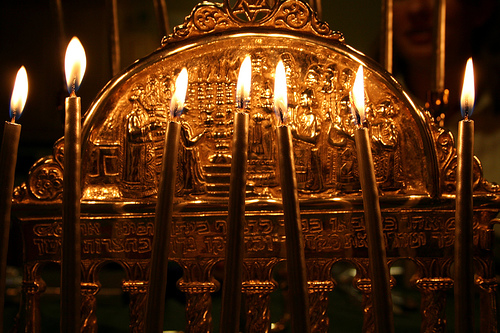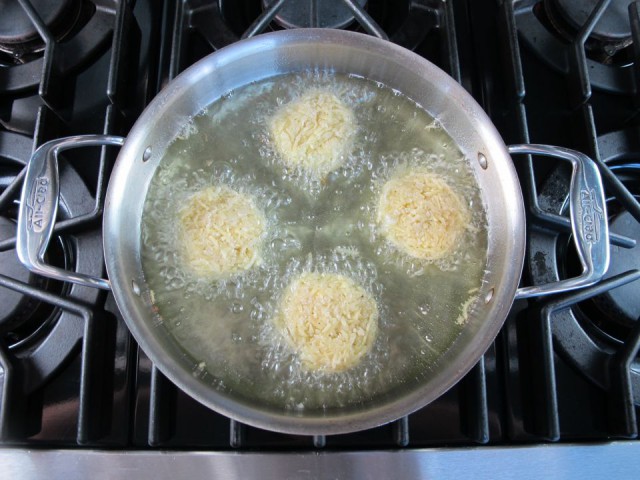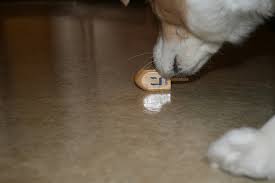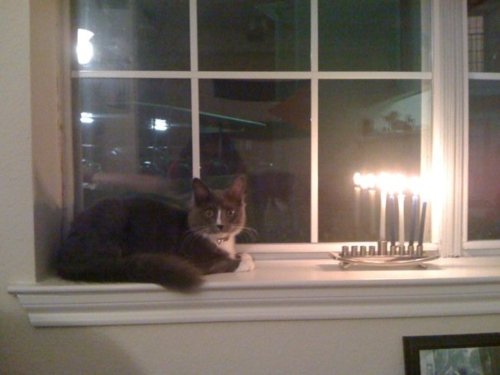Hanukkah Pet Safety Tips

As we start this festive season, it is a great idea to remind ourselves about potential holiday hazards for our pets. Every time your normal household routine is disturbed, opportunities for injury or illness can arise. Even straying too far from your pet’s normal diet can cause problems. Holiday “complications” that we commonly deal with here at VMC range from the mild to the severe. Unusual food items can simply cause some vomiting, diarrhea and tummy upset. Unfortunately, they can also cause much more serious problems.
Dietary Indiscretion (aka “Garbage Gut”): A very common reason for a trip to the VMC’s emergency room unfolds innocently in a busy holiday household. The meal is over and everyone is too full to pay attention to where the leftover food is in relation to your pets. Your pets have been waiting literally all day for such an opportunity, and are busily helping themselves to the overstuffed trash container and/or the leftovers on the counter. While dogs are usually the main offenders in cases of “garbage gut,” cats are not immune! Within a few hours some combination of vomiting and diarrhea requires a trip to the emergency room.
Pancreatitis: Pancreatitis is a swelling or inflammation of the pancreas. Severity can range from mild to life threatening. Pancreatitis is typically caused when our pets eat foods that are much higher in fat than their bodies are used to (think brisket and latkes). If your pet accidentally gets into scraps (or if another family member sneaks them some!), watch for vomiting, diarrhea, signs of abdominal pain (your pet may appear “hunched up” if pain is severe enough), loss of appetite, weakness, or collapse. If you notice any of these signs, bring your pet to your family veterinarian or the VMC as soon as possible. If pancreatitis is left untreated, it can lead to severe liver and kidney damage and can potentially be fatal.

Chocolate: Wrapped chocolate gelt is doubly dangerous for our pets. The gold foil wrapping can cause digestive upset and obstruction, and the chocolate is toxic to our pets even in small amounts. Store well out of their reach and keep an eye out for dropped wrappers or candy.
Onions: Onions have the potential to destroy red blood cells in both cats and dogs, leading to anemia. Onions contain an ingredient called thiosulphate, which causes a condition called hemolytic anemia. Symptoms can take up to two to four days to appear and can include respiratory distress, diarrhea, vomiting, and lethargy. Small amounts of onions can cause problems, so use caution when storing, serving, and disposing of these foods. Another reason our pets should avoid latkes!
Raw dough: Making challah or sufganiyot? Raw dough can expand in a pet’s stomach and require emergency surgery. Make sure that rising dough is well out of reach.
Any food fried in oil: Hot oil and pets don’t mix. We’ve treated the effects of hot oil spilled on pets as well as pets who have eaten too many fatty treats. Both scenarios are best avoided.
OTHER HAZARDS:

Dreidels: Small dreidels lying around may be swallowed, particularly if there is a young dog in the house. This creates a choking risk as well as the risk of digestive system obstruction.
Menorah: Candles and pets are always a dangerous combination. Cats can jump up around the menorah and dogs can knock down burning candles. Don’t leave the menorah candles burning unattended unless pets are blocked from that area.
Gifts: Many pets are naturally curious, particularly young pets, and they explore the world with their mouths. Any unusual objects lying around have the potential to be chewed and swallowed. Exchanging gifts often generates lots of unusual objects (wrapping, ribbons, packaging, batteries, etc.) that can create choking hazards and other potential dangers.

STAYING SAFE
Prevention! Take some simple steps during this festive time so that you can relax and enjoy!
- Block your pet’s access to areas where food is stored openly on counters and tables. If you can’t supervise the area, make sure your pet can’t access it either.
- Talk to your guests about the risks, and ask that they honor a “no treats” rule to protect your pets. If your pet is used to lots of table scraps and changes in diet, a few treats here or there should be OK. Be aware, however, that if you have lots of guests and they are each giving “just a little bit” the amount can really add up quickly – especially for our small pets.
- Children will drop food. Your pets will eat it. Plan for that.
- Ensure that trash bins are secure. Remember that the packaging the food came in will be just as alluring to your pet as the food itself. With larger quantities than normal of food in the house, proper disposal becomes more of a challenge.
- Expect the unexpected. We see cases where dogs eat things like mulch and stones outdoors because someone has cleaned the grill or dumped some cooking oil. The resulting “seasoning” on the mulch or stones is just irresistible to the dog. These cases almost always require surgical removal of those substances.
- Take time to observe your pet’s behavior. If the holiday festivities seem to be taking a toll, ensure that your pet has a quiet, secure space to rest in.
As always, be prepared – know where your closest emergency veterinary facility is located, just in case your pet needs care! Visit www.vmccny.com for directions and more information about our facility.
Above all, enjoy your family, your pets, and your holiday season!
About Us
At Veterinary Medical Center of Central New York, we understand that the health of your pet is a top priority. In the case of an emergency or a condition requiring specialized care, we're here to treat your pet in our state-of-the-art, 24-hour Emergency and Critical Care Center.
